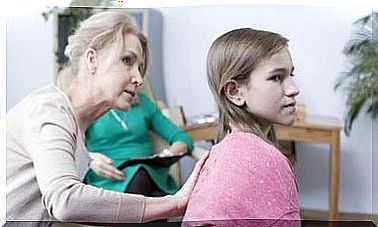Child Brain Development And The Importance Of Love

Have you ever wondered how important it is to really get affection and intimacy for your baby? There is a lot of research data on the subject, and today it is known that a child’s brain development depends a lot on the love expressions of a mother, father, or other important caregiver.
Child brain development and the importance of love
The first three years of a baby’s life are paramount to brain development because during these years, hundreds of different systems develop in the brain. These are very important for the functioning of the human mind. In the first years, systems related to the emotional response to stress develop in particular.
Sue Gerhardt is a British Psychotherapist who specializes in examining babies. According to him, it is really important that the baby does not experience much stress, as this can prevent the development of nerve cell connections in the brain.
Babies actually experience stress really easily, says Gerhardt, author of Why Love Matters . He explained in an interview that stress produces cortisol, and too much of this hormone can prevent the development of nerve cell connections in the baby’s brain.
The various biochemical circuits present in the upper parts of the human brain begin to develop in the child during the first three years of life. This therefore means that man is not born with these, but they either develop well or do not. This depends on the experience, care, supervision, and expressions of love that the baby receives from the adults who are significant to him.
Therefore, it is very important that parents look their child in the eye, smile, play with the baby, hold this in their arms and touch this. All of these things produce feelings of pleasure and security that help significantly avoid stress. They also control cortisol levels and allow for healthy brain development in general.

Love improves baby’s brain development
Affectionate parenting is a style of parenting that helps a child develop mechanisms to regulate his or her own cortisol levels. When a baby is born, she is unable to do this on her own – she is dependent on her mother and the other adults around her to make regulation happen.
Gerhardt believes that for a baby, being separated from his or her guardian for a long time can be very stressful, as he or she is dependent on this for his or her own survival. Therefore, leaving your baby alone in bed can be a really difficult experience for him.
Gerhardt names other types of situations that can be really stressful for a baby, including the presence of overly stimulating things such as sounds, many new faces at a family party, for example, frustration, and the fear of falling when the baby tries to learn to crawl or walk.
These are things that can cause a lot of stress to your baby, and if you think about it more closely, they are stressful for yourself too – and for any adult! The difference, however, is that we adults have defense mechanisms that allow us to deal with the high amount of cortisol produced by these situations.
As you know, when an adult feels too stressed, for example, he goes to drink a cup of coffee or tea, calls a friend and complains about his worries, walks or runs, reads a little book… But the baby only has his mother and other guardians, and therefore your baby cries when you leave him.

The baby needs to feel safe to develop well
The safety that a baby experiences while in his or her mother’s arms is just as important as sleep, food, or protection from the cold or any other threat. The attachment theory was once developed by the English child psychiatrist John Bowlby. This theory describes that from birth and until the child becomes independent, he needs his body (or some very close caregiver with whom he has a strong bond and can interpret the child’s behavior and give the things he needs), body, warmth, attention, care and constant gentle touch.
All the love and care you give your child contributes to the development of great connections in his or her brain that will help him or her do his or her best to resolve and face the many different situations that life can bring forward.
This is no embellishment or exaggeration, for in fact, in recent years, neurology has already been able to figure out the importance of the connection between showing love and developing a bond between the baby and his mother. This is because the development of a baby’s brain depends on his or her interaction with the outside world, and especially on relationships of love with caregivers.
It has been found that the love a mother shows towards her child and the affection of parenting in the first years of a child’s life up to five years contribute to the development of the brain of a small person. This is illustrated, among other things, by a study conducted at the Faculty of Medicine at Washington University in St. Louis.
Affection parenting is something that has been talked about a lot in recent years. It sometimes shares opinions, and there is a wide range of expert knowledge on the move. So if you’ve ever wondered what role proximity to a mother or other important people and showing love to a baby’s brain plays, now you know – it plays an extremely extreme role in a person’s well-being both during and after baby.









